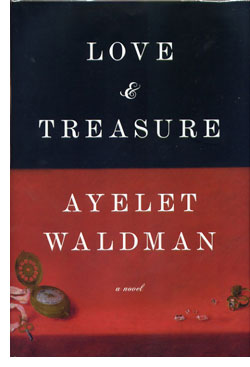 |
 |

Ayelet Waldman
Love & Treasure
Alfred A. Knopf / Borzoi Books / Random House
US Hardcover First Edition
ISBN 978-0-385-53354-6
Publication Date: 04-01-2014
338 Pages; $27.95
Date Reviewed: 04-30-2014
Reviewed by: Rick Kleffel © 2014
Index:
General Fiction
Mystery
The past is distilled in the present. A tiny piece of jewelry might be all that is left of a once-great family. A ruined hovel in front of a heaving factory might have been the guardhouse for a luxurious estate. It's not that "we don't know what we've got 'till it's gone." We cannot know the past by what is lost, or survives into the present. But we can know the past by knowing the present, and understanding that one day it, too, will be lost. Perhaps sooner rather than later.
All this factors into the way that Ayelet Waldman unfolds the story in 'Love & Treasure,' a novel in triptych form, with three different narratives separated in time, but connected by character, by event, by theme — by story. A brief prologue sets up the novel, but as the stories unfold, the internal connections between the works become clear. It's a novel that the reader can enjoy on two very different levels. Each of the three stories works well alone, but real joy here is, as a reader, putting together the bigger picture, reading outside the narrative to create the world that Ayelet Waldman has envisioned.
After the prologue, the first narrative tells the story of Jack Wiseman, a Jewish soldier in Salzburg after World War II who is tasked with guarding what has come to be known as the Hungarian Gold Train, holding the Nazi horde of loot taken from Hungarian Jews before they were sent to Auschwitz. Jack meets a refugee, and their courtship unravels in the midst of a city and a world, falling apart in the aftermath of the war.
The next story takes place in the present, as Jack's granddaughter tries to trace an heirloom and is drawn into the world of Holocaust Art restoration, a morally treacherous ground where ruthlessness and greed butt up against tragedy and loss. The final segment takes place in Salzburg in 1913, well before the war, and is told in the first person by a pompous psychiatrist with an unwilling patient. It's here in the past, that what we've lost becomes clear, and how the stories interlace.
|
There's a lot to talk about in 'Love & Treasure.' Hovering over the novel as a whole is the Holocaust, but it's not exactly a Holocaust novel. Our worst moments are never seen, only inferred or mentioned by characters still too traumatized and under-informed to grasp the reality. It's an absent presence that casts a large shadow.
With 'Love & Treasure,' Waldman really offers a panoptic vision the war and humanity. Jack's story is both a detailed historical vision, a world precisely and delicately built, and an immortal love story, with a smart bittersweet aftertaste. In the present-day sections, we're taken into another secret world, in which two characters collide and collude.
It's the third section that brings the novel together, with a shift in writing style (first person versus third person) and tone, as here Waldman evinces a wry, dry sense of humor that is truly, delightfully delicious. The story is really quite hilarious, turning on Charles Fort's insight that, "I can conceive of nothing, in religion, science or philosophy, that is anything more than the proper thing to wear, for a while." As with the other sections, Waldman here very carefully and very concisely builds a world for the reader.
For all the time-hopping and perspective shifts, Waldman keeps things incredibly terse, but never too much so. 'Love & Treasure' feels rich and full in each section and as a whole, as a novel, and not just a collection of stories, the fact that the reader gets to build the bigger story, and the bigger picture makes the entirety of the reading experience much more powerful. Moreover Ayelet Waldman accomplishes two very different goals in this book; she provides a pleasurable reading experience that has real heft. We need not see what casts the shadow. It is more important, more joyous, more human to know what has been blotted out, and what remains after.
|
 |
|
|
 |
| |
Review Archive
All Reviews alphabetized by author.
General Fiction
Non-Genre, general fiction and literature.
Horror
Supernatural fiction, supernatural horror and non-supernatural horror.
Science Fiction
Science fiction, science fantasy, speculative fiction, alternate history.
Fantasy
Fantasy, surrealism and magic realism.
Mystery
Crime, thrillers, mystery, suspense.
Non-Fiction
Non-Fiction, True Crime, Forteana, Reference.
Poetry
|
|
 |
|




